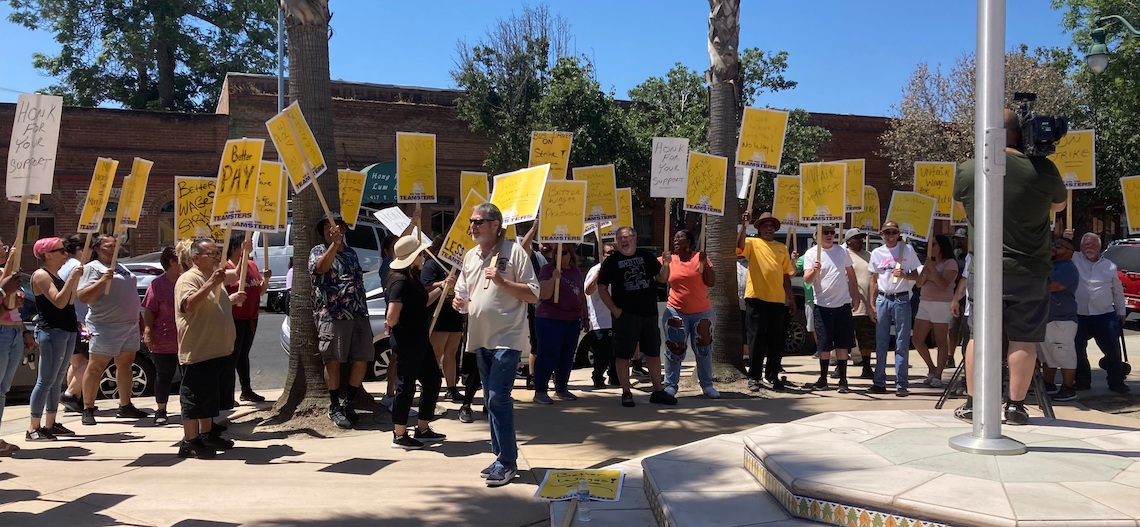
Visalia Transdev workers strike in early July as part of the Teamsters union. Teamsters photo
Written by Frank Lopez
There’s no doubt that 2023’s so-called “Labor Summer” was prompted in part by inflationary pressures being felt by workers in California and across the country.
According to a report from Cornell University’s School of Industrial and Labor Relations, there were 109 strikes and 116 labor protests in the Golden State in 2023.
There were high-profile strikes and labor strife involving the United Auto Workers and even Starbucks.
The Central Valley saw its own share of labor protest as well.
In December, workers of a popular coffee shop in Downtown Fresno conducted a work stoppage over various issues including working conditions, tipping and plans for the employees to buy the business that never materialized.
Fulton Street Coffee was closed for a few days before reopening with new workers.
In July bus workers for French transit company Transdev, represented by Teamsters Local 517, went on strike, seeking, “a living wage and fair contract,” as well as additional sick days.
The strike ended near the end of August, lasting over a month before a new contract was finalized.
Other strikes in 2023 included Kaiser Permanente workers and just this week faculty for the California State University system.
With so much labor unease, how should employers navigate these waters?
Strike out
Shelline Bennett, partner with Liebert Cassidy Whitmore, a law firm specializing in labor and employment law, believes work stoppages will continue. Liebert Cassidy Whitmore is California’s largest education and public sector labor and employment firm.
She hasn’t seen this rate of strike activity in the 17 years that she’s been practicing. It’s even more than after the Great Recession of 2008.
According to the Cornell report, unions engaged in the most work stoppages in the U.S. since 2005.
Bennett said there are three types of strikes for both private and public employers to be aware of.
One is an economic strike, where employees insist they need more money.
Another is an unfair practice strike, where employees are in some way protesting their employers in what they would call “bad faith” bargaining action.
The third is a sympathy strike, where it’s not necessarily impacting employees that are striking, but a tangential group of employees showing solidarity or refusing to cross the picket line.
“Generally, these types of strikes don’t come out of the blue,” Bennett said. “It’s not like employers are blindsided by these. It’s usually when employees and employers are at the bargaining table trying to negotiate a contract, and they’re not getting to agreement.”
Employees do not have an absolute right to go on strike, she said. There are typically a set of occurrences that come before a lawful strike.
One is that both parties have come to an impasse at the negotiating table, and the other is employers engaging in bad faith action.
Employers, prepare
Since employers will know in advance that employees will strike, they should be prepared well before that occurs.
Employers should arrange for replacement workers if necessary, and how to get their workers to the worksite and do their job safely.
Employers might also want to make their customers aware that job action is taking place and ensure them that their services will not be disrupted.
Employers also might want to beef up their security, Bennett said, not because striking workers are inherently violent, but because individuals have high emotions during these events and there is a potential for violence.
Striking workers might be out of work for an extended period and feel a significant financial impact. Employers should be aware of what their employees are going through, she said.
“Ultimately the strike will end. And when it does employers will have to repair those relationships. You’ve got to come back together to figure out how to heal and mend what was likely a contentious situation,” Bennett said.
If an employee’s performance is not satisfying employers, they must be careful to document and inform the employee of their performance. If an employee is fired after a strike, they might claim it is retaliatory, so employers should communicate with their employees in writing to protect themselves.
There are laws that require employers to sincerely listen to their employees and try to come to an agreement, she said. That’s the first thing they should do when they hear wind of a strike.
Retaliating against workers conducting a lawful strike is illegal, and employers must go to their legal counsel before they do anything that adversely affects employees engaged in protected activities.








